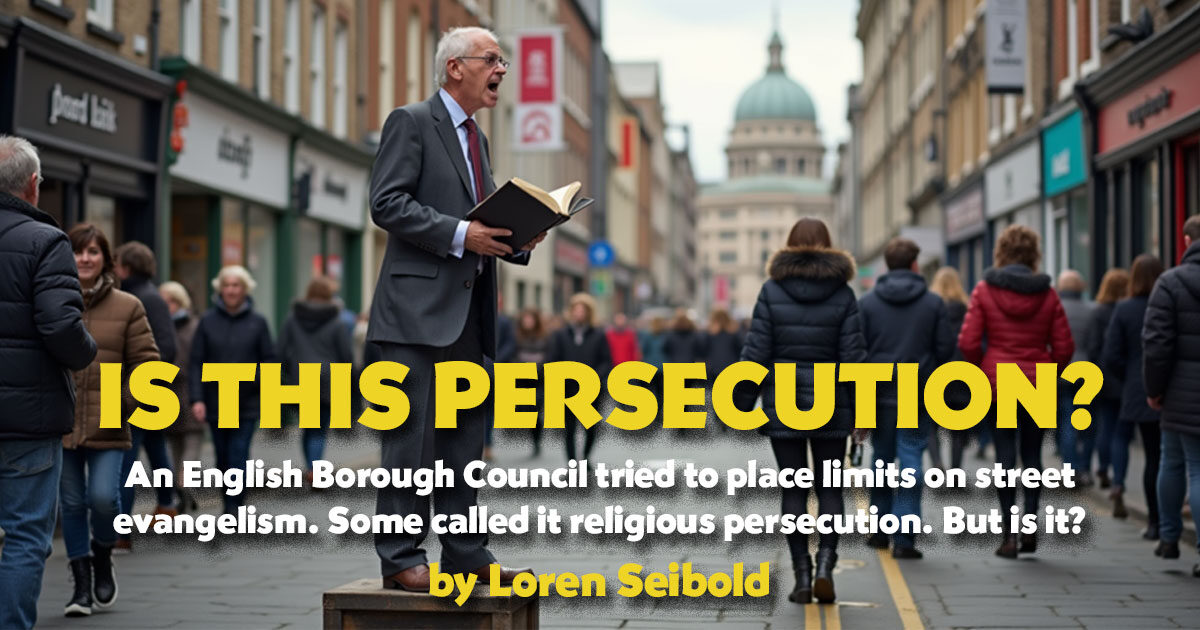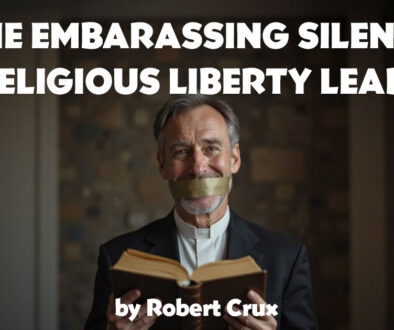Is This Religious Persecution?
Loren Seibold | 29 May 2025 |
I was interested to read of a recent (April) action by the Rushmoor Borough Council (a region southwest of London, England, that includes the cities of Aldershot and Farnborough) to restrict the activities of street evangelists. The ban included
“Praying, whether with outstretched arms or otherwise, for anyone visiting, working or living within the Town Centres of Aldershot and Farnborough….
“Offering up or personally handing to anyone visiting, working or living within the Town Centres of Aldershot and Farnborough…any leaflet, letter or poster or other written material.
“Touching anyone visiting, working or living within the town centres of Aldershot and Farnborough… this includes the laying of hands on anyone in prayer.
“Approaching anyone who is not themselves street preaching for the purpose of engaging them with discussion about religion or belief.
“Engaging in street preaching which is hostile towards anyone with the protected characteristic of age, disability, gender reassignment, pregnancy, race, religion or belief, sex, sexual orientation.”
Not surprisingly, Christians in the UK and the United States went into crisis mode. “How can you ban prayer?” some asked. This felt like persecution. The Christian Legal Centre attacked the ban as overly broad and against principles of free speech, and not long afterwards the Council backed down.
Of course, that wasn’t the whole story.
Street preaching
Public preaching goes back a long way. Many of the prophets apparently preached in public. Ezekiel actually performed a sort of street theater: he built a tiny model of Jerusalem and destroyed it, cooked food made with human waste, and lay on his side for a year, all to demonstrate that God would allow a Babylonian siege against the city.
John the Baptist preached outdoors near the Jordan, where he could easily baptize. Jesus made appearances in synagogues and the temple, but mostly his ministry was in the open air. When Paul was in Ephesus he preached and cast out demons for several months in both the synagogue and the agora, but raised a mob when his message threatened the livelihood of those selling statues of the many-breasted goddess Artemis.
There were many public preachers in the Christian church era, but the one who had the biggest impact on modern evangelicalism might be John Wesley. Wesley preached to miners and other poor working people. He brought his message and methods to frontier America, leaving behind a strong evangelistic tradition.
There are Adventist street preachers in some parts of the world, but even where that isn’t common, we Adventists haven’t been shy about going door-to-door, or setting up our tents in public places and inviting people in.
To opponents, the Rushmoor injunction was a direct assault on not just the Christian faith, but on the long tradition of public evangelism. Why not let people stand on the sidewalk and proclaim that Jesus is Lord?
Annoyance evangelism
Evangelical Christians brought up the spectre of persecution. Intercessors for Britain wrote,
Christian values and practices are increasingly being attacked in our nation, but God in His mercy hasn’t completely given us into enemy hands, and we pray that this ban won’t go ahead.
The sentence after that one, though, shows that even Intercessors for Britain knew what the real problem was.
(At the same time, we pray that Christians who minister on the streets will have wisdom, and display both grace and truth as Christ did, so as not to bring Christ’s Name into disrepute.)
This.
Anti-injunction voices dominated the press. But in fact, the borough council had reasons. One commenter, who identified herself as a Christian, wrote,
As someone who lives in the area, this was started in 2023 as a result, not of the various Christian street preachers who do so in a peaceful way, but as a result of a group who at different times were all reported to police repeatedly for verbal abuse, scaring children & physical touching/grabbing/pushing children & adults. I am a Christian. I have God in my life—& even I, walking past without saying anything, was abused by the gentleman in question.
Another opined,
Let’s be honest, evangelicals: lots of our street preachers are mentally ill, antisocial, aggressive, have oppositional defiant disorder or are otherwise very low functioning. I am not slandering them. I have met them, spoken with them, known them. Some have criminal records. Some are drug users. Their dysfunction gets tangled up in their evangelical zealotry. … When street preachers get arrested, it’s typically not for speech. It’s for intimidation, trespassing, public nuisance, starting fights or other illegal behavior.
The terms of the injunction make clear what the problems were: amplification so loud it would hurt your ears, preachers shouting at and even grabbing passers-by who were minding their own business, blocking pedestrians’ progress to pray over them or force literature into their hands, or verbally abusing people who were LGBTQ.
(The injunction expressly allowed having a display with literature that people could take. They weren’t stopped from witnessing—it just had to be voluntary on the part of the recipient.)
In the end, it appears the council decided that it was not preaching they should have addressed, but aggression—but not before they got the “we are being persecuted!” Christians thrillingly riled up.
I say “thrillingly,” because there’s nothing some Christians enjoy as much as claiming they’re persecuted.
Identifying possible religious persecution is the main activity of religious liberty folks—and rightly so. But it also has led some of us to find persecution everywhere we look. A guy once told me he was being persecuted because I wouldn’t let him stand up and disrupt our church service.
And of course, when the pope said that Christians should all go to church more often, some Adventists rose up on their hind legs to say that he was about to commence persecution of Sabbath-keepers—even though that’s not what he said.
The Great Controversy
Which brings us to The Great Controversy.
There have been many articles in the press about Adventists’ cold mailing millions of copies of The Great Controversy. The response to the mailings has been almost universally negative. Even an Adventist friend of mine who lives in an apartment complex complained about the books clogging up her building’s mailroom. The superintendent dragged in extra rubbish bins for people to dump their copies. Her neighbors, who knew she was a Seventh-day Adventist, began to look at her askance. Pastors have told me of copies dropped off at their churches with angry letters about the book’s negativity toward Roman Catholics and “apostate Protestants.”
I’ll just say it: The Great Controversy is blatantly anti-Catholic. If you don’t like hearing that, please imagine someone sending out tens of millions of copies of a book saying that we Adventists are their particular enemy, and that we are evilly plotting to throw them in jail and torture them, and that the head of our church is in league with Satan. We would identify it as hate speech, and General Conference legal would get involved.
Religious intolerance is a very poor look for a church that claims to be a champion of religious liberty.
Yet if some government entity declared this to be hate speech, some Adventists would say we are being persecuted. If a community said, “We don’t want you to stuff our residents’ mailboxes with this literature,” we wouldn’t admit that we were annoying the hell out of people by dumping these books on them; we would say we were being unfairly treated—all the while proclaiming “The end is near!”
Of course, this says more about us than it does about God’s plans. For my part, I agree with the Rushmoor Borough resident who wrote,
If you are preaching the words of God and trying to bring him into the lives of those you believe are without him, then do it with love and kindness.
Which to me means not annoying people, either with aggressive street evangelism or big fat books that make cruel accusations.
 Loren Seibold is the Executive Editor of Adventist Today.
Loren Seibold is the Executive Editor of Adventist Today.




